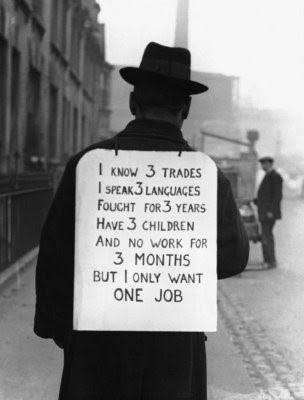Employers Are Not Responsible For Your Chosen Lifestyle
Employers didn’t create your lifestyle, so why would you expect employers to be responsible for it?
Recently, I came across the above picture of a man during the Great Depression wearing a sandwich board advertising that he was looking for work. Aside from the number of people who'll see it, his sandwich board doesn't differ much from the 'I'm now available' posts I see on LinkedIn.
The picture made me think, '90 years ago, job seekers made the same mistake as they do today, saying what they want instead of explaining what they can do. Did he expect employers to stop and ask him what the three languages and trades he speaks and knows are? Did he think broadcasting that he’d fought for three years and has three children would motivate employers to hire him?
Today, job seekers have the Internet and social media, especially LinkedIn, to broadcast (advertise) that they're looking for work—no need to wear a sandwich board—and are making the same mistake that the man in the picture made.
Like me, you probably see the many 'Open to Work' posts on LinkedIn from newly minted job seekers sharing what they want—remote work, a six-figure salary, unlimited PTO, benefits to start immediately—when they should be touting their skills and sharing quantifiable achievements that demonstrate the value they can bring to an employer, such as:
Willing to work on-site. (Don't underestimate how attractive this is to employers.)
Speak English, French, and Spanish fluently.
Certifications (e.g., Project Management Professional (PMP), AWS Certified Solutions Architect, Certified Information Systems Security Professional (CISSP), Certified Ethical Hacker)
Managed a portfolio of projects valued at $47 million, ensuring a minimum ROI increase of 25%.
PMO head with over 15 years' experience managing portfolios ranging from $50 to $100 million and leading global IT teams of up to 100.
Over the course of 12 years, I sold 513 Corvettes in Las Vegas. (A candidate actually told me this, and I ended up hiring him. Within three months, as part of an inside sales team of 39, he was leading in POS sales.)
In 2018, I secured over $85 million in mortgage loans for clients.
I'm the person behind the EcoBrew "Sip Sustainably" campaign.
Answered between 60 and 80 calls daily. Since 2022, I have consistently maintained a client satisfaction rate of 95% or higher.
Delivered over 30 keynote speeches at national banking conferences and industry events, engaging audiences of up to 1,500 people.
I led the team that developed the code for HAL 9000.
I believe most people are willing to help job seekers if they can, which is good news since companies are comprised of people. Therefore, right now, there are job opportunities all around you attached to people (employees), illustrating the importance of networking. The caveat is that you need to make it easy for people to help you, starting by giving them more context than "I'm looking for a job."
Do you think someone, especially someone in a position to hire you, takes unsubstantiated opinion statements like "I'm a team player," or "I'm detail-oriented" seriously? Is using statements such as "I have rent and bills to pay" or "I'm running out of savings" an attempt to guilt employers into hiring you?
When posting an ‘Open to Work’ announcement, include the essential information—context, clarity—that hiring managers, recruiters, directors, executives, and an employee needs to evaluate whether you can add value to their company. To further reduce friction and boost your chances of receiving help, follow my one rule—a goal to aim for—for writing bullet points for a resume, LinkedIn profile, or an "Open to Work" announcement: Write each bullet point so that the reader thinks, "I must meet this person!"
At the risk of sounding overly blunt, each of us freely created our respective lifestyles or bought into marketing propaganda that influenced us to create it. Employers didn’t create your lifestyle, so why would you expect employers to be responsible for it? Your worth to an employer isn't determined by your lifestyle or the cost of living.
Your worth, from an employer's perspective, is solely based on the value they believe you can bring to their business. Therefore, the more specific value you can demonstrate—and provide evidence of, such as "Grew TikTok followers from 0 to 10,000 in four months with creative video content," [link to video added]—rather than just saying "Managed social media"—the more likely your 'Open to Work' post will generate engagements that could lead to your next job.
An employer-employee relationship, as anyone who has been in the corporate trenches should know, is a business relationship, not a personal one. Thereby, not an employer's concern:
The lifestyle you choose to live.
The cost of living going up.
Your career.
If you want your "I'm looking for a job" broadcasting efforts to pay off, then start hyper-focusing on showcasing your value to employers. The more you demonstrate your value add, whether when posting your 'Open to Work,' throughout your resume, LinkedIn profile, while networking and interviewing, the shorter your job search will be. Job searching isn't about making employers guess what you can offer; it's about communicating your value without expecting employers to be responsible for your lifestyle.
BONUS:
A brilliant Infographic by Careerflow.ai
Nick Kossovan, a well-seasoned corporate veteran, offers “unsweetened” job search advice. You can email Nick at artoffindingwork@gmail.com with your questions.
If you would like to connect, here are my social media accounts:








This is very valuable information.
Oh dear.
Was that a real post about the dog owning job seeker?
I can't count the number of times I've told people to talk about what they can do for an organization rather than what they want.
Great advice!